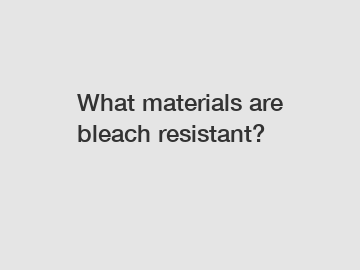Jan. 15, 2024
Textiles & Leather Products
SHUOLAN Product Page
What materials are bleach resistant?
Bleach is a powerful disinfectant and stain remover that is commonly used in households and industries. However, there are certain materials that are not compatible with bleach and can be damaged or discolored when exposed to it. On the other hand, there are some materials that are bleach resistant and can withstand the harsh effects of bleach. In this article, we will explore the materials that are known to be bleach resistant, the reasons behind their resistance, and the significance and impact of these properties.

1. Stainless Steel.
Stainless steel is a popular material known for its durability and corrosion resistance. It is widely used in kitchen appliances, medical instruments, and industrial equipment. One of the reasons stainless steel is bleach resistant is due to its unique composition. It contains chromium, which forms a passive oxide layer on its surface, protecting it from chemical reactions and preventing corrosion. The passive oxide layer acts as a barrier, making stainless steel resistant to the corrosive nature of bleach.
2. Glass.
Glass is another material that is bleach resistant. Due to its nonporous nature, bleach cannot penetrate the surface of glass and cause any damage. Additionally, glass is inert and does not react with bleach. This makes glass an ideal material for storing or mixing bleach solutions as it maintains its integrity and does not release any harmful substances.
3. Certain Plastics.
Not all plastics are bleach resistant, but there are specific types that can tolerate bleach without experiencing any adverse effects. Polypropylene and high-density polyethylene (HDPE) are two commonly used plastics that are known for their bleach resistance. These plastics have high chemical resistance and do not easily react with bleach. They are often used in the production of bleach bottles and containers, ensuring the bleach remains contained without affecting the integrity of the material.
The significance of knowing which materials are bleach resistant lies in the practical applications and safety measures. For instance, in a healthcare setting, it is crucial to use bleach-resistant materials for equipment and surfaces that require regular disinfection. Using materials that are not bleach resistant can not only damage the equipment but can also compromise the effectiveness of the disinfection process. Similarly, in households, understanding bleach-resistant materials can help in choosing appropriate cleaning tools and surfaces to maintain cleanliness without causing any damage.
In conclusion, stainless steel, glass, and certain plastics like polypropylene and HDPE are known to be bleach resistant materials. These materials possess properties that make them resistant to the corrosive and damaging effects of bleach. Understanding the bleach resistance of different materials is vital for choosing appropriate materials for various applications, ensuring their longevity, and maintaining the effectiveness of bleach as a disinfectant. So, whether it's for household use or industrial purposes, selecting bleach-resistant materials plays a significant role in maintaining cleanliness and safety.
Want more information on uniform material fabric? Feel free to contact us.
Previous: Ultimate Guide to Turban Towels for Hair
If you are interested in sending in a Guest Blogger Submission,welcome to write for us!
All Comments ( 0 )